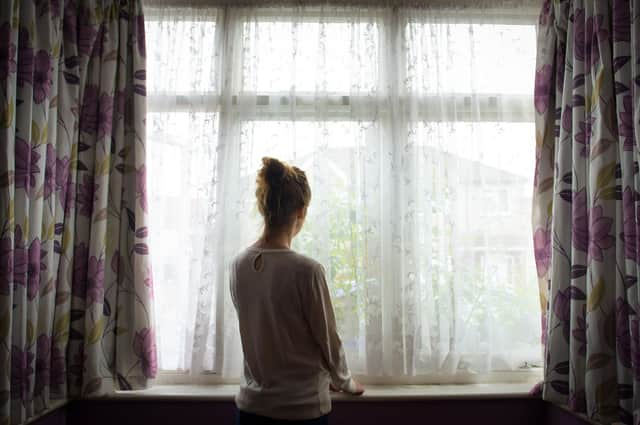Prostitution: Scottish government has moral duty to introduce Nordic model, criminalising paying for sex, if it reduces demand – Susan Dalgety


Scotland even has its own adult entertainment trade union branch, set up by Rhea Wolfson, GMB organiser for Glasgow.
“Sex work is work, and it should be safe,” she said when announcing the initiative in 2019. Except sex work isn’t work – it is violent, exploitative abuse of women and girls. Just ask 16-year-old Esther.
Advertisement
Hide AdAdvertisement
Hide AdEsther Banda and her two friends grew up in a small village in a remote part of Neno district in Malawi. She didn’t attend secondary school because she was needed at home to help tend crops, fetch water and other household chores.
She dreamt of visiting a big city one day, maybe even getting a job as housemaid, so when a stranger came to their village recruiting girls for work, Esther’s parents encouraged her to go.
When they reached Manje township in Blantyre, Malawi’s largest city, there were no happy families waiting for them. Instead, the girls were told their job was to make and sell the local homemade spirit, kachasu, and provide sex for their customers. In return for this “work”, their captors promised them £20 a month.
For three months, the girls were imprisoned in a filthy room, while up to ten men a day raped each one of them. They existed on the most basic diet, until they escaped and headed to the nearest police station.
According to Equality Now, a London-based charity which campaigns to end sex trafficking across the globe, Malawi has very strong legislation around sexual exploitation, but its criminal justice system struggles to implement the laws, as Esther was to find out.
She and her friends found shelter at a Victim Support Unit while their trafficker was tracked down and charged. While in care, Esther was found to have a serious sexually transmitted disease and post-traumatic stress disorder (PTSD).
On the day of their trafficker’s trial, the girls disappeared. “They ran away,” the prosecutor informed the judge. The trafficker was granted bail and an order put out to find the girls.
It was at this stage that Equality Now’s Malawi partner, People Serving Girls at Risk (PSGR), got involved. The charity found Esther and discovered that she and her friends had not run away to avoid giving evidence, but had been abducted by their traffickers, put on a bus back to their home village and warned that if they ever said anything about their ordeal, they would be killed.
Advertisement
Hide AdAdvertisement
Hide AdEsther eventually gave evidence, supported by PSGR, but the trial petered out amid a litany of excuses including power cuts, missing witnesses and late summonses. Justice has yet to be served for Esther and her friends, and the pandemic has only put even more girls at risk. Before Covid, PSGR received up to three sex trafficking referrals a week. This has now spiralled to one a day.
The charity’s executive director, Caleb Ng’Ombo, spoke to me earlier this week. “Traffickers are capitalising on the economic challenges that have resulted from the pandemic,” he explained. “Only recently, we helped the Malawi police rescue 43 girls who had been trafficked from Thyolo, in the south, to the capital Lilongwe.
“Our appeal to the government of Malawi is for them to take the prosecution of sex trafficking seriously, these cases must be prosecuted and the victims must have access to justice. And we need a national campaign to make vulnerable girls and their families aware of the dangers.”
Sex trafficking is not just a problem in low-income countries like Malawi. UN Women estimates there are millions of undetected cases a year, and the overwhelming majority of victims (94 per cent) are female.
Some are in Scotland. A few women will have been brought here from abroad and coerced into prostitution. But many others will be Scottish women forced into selling their bodies because of poverty, abuse or both.
These so-called “willing participants” are as much victims as Esther and her friends. As Dundee-based campaigner Diane Martin, who herself was trafficked for sex as a young woman, said recently, “… we must recognise prostitution and sex trafficking as the same thing”.
The Scottish government is currently considering adopting a version of the Nordic model of prostitution, where seeking to buy sex would become a criminal offence. Following a consultation last December, the government has said it will develop its own “bespoke” model, but it faces strong opposition from some unlikely sources.
Dr Marsha Scott, the head of Scottish Women’s Aid, has already made clear her organisation will not back any reform based on the Nordic model. In a letter earlier this month to Diane Martin, she wrote, “… it’s impossible to criminalise the buyer without impacting on the woman by completely disempowering her and taking away any small bit of choice she has in this awful power dynamic”.
Advertisement
Hide AdAdvertisement
Hide AdThere is no choice for women and girls involved in trafficking, prostitution, sex work – whatever term you use. Just ask Esther, sold into sexual slavery while still a child, or any one of the women in Scotland whose job description includes giving oral sex to a man who has not washed for a week.
Today, the world over, millions of women and girls will be sexually abused. Some will have a few coins tossed at them in disgust, a very few will earn hundreds of pounds, all will be diminished.
If the Nordic model reduces the demand for paid sex, as research suggests it does, then surely the Scottish government has a moral duty to change the law, because the terrible truth is that there will never be equality between men and women while sex remains a legal commodity.
